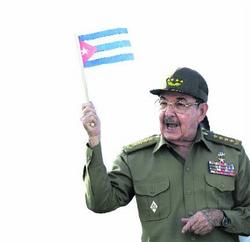
Raul Castro says he will still consult his brother Fidel. - File
HAVANA (AP):
Cuba's Parliament named Raul Castro president yesterday, ending nearly 50 years of rule by his brother Fidel but leaving the island's communist system unshaken. In a surprise move, an old guard revolutionary leader was named No. 2, suggesting that major changes are not likely any time soon.
The retirement of the ailing 81-year-old president caps a career in which he frustrated efforts by 10 United States presidents to oust him.
Raul Castro stressed that his brother remains "commander-in-chief", even if he is not president, by proposing to consult with Fidel on all major decisions of state - a motion approved by acclamation.
Josť Ramon Machado, who fought alongside the Castro brothers in the Sierra Maestra during the late 1950s, was named to the No. 2 slot that Raul Castro had previously held. He is 77 - a year older than Raul Castro.
Cabinet secretary Carlos Lage, who many had expected would move up into the first vice-president slot, maintained his spot as one of five other vice-presidents on the governing Council of State.
The other four vice-presidents included Juan Almeida Bosque, 80, a historic revolutionary leader; Interior Minister Abelardo Colome Ibarra, 68; Esteban Lazo Hernandez, 63, a long-time Communist Party leader, and General Julio Casas Regueiro, 71, who was Raul Castro's No. 2 at the defence ministry.
The council secretary remained Dr Josť M. Miyar Barrueco, 75, physician and historic revolutionary leader, and long-time aide to Fidel Castro and Council of State.
Castro's seat in the National Assembly was empty, but as the new National Assembly's 614 members were read aloud, mention of the absent Castro drew a standing ovation.
Raul's road to the presidency
TITLES: Minister of the Revolutionary Armed Forces and second secretary of Communist Party of Cuba. Named provisional president on July 31, 2006.
BORN: June 3, 1931, fourth of seven children.
EDUCATION: Attended Roman Catholic schools; studied administration at University of Havana.
BEFORE THE REVOLUTION: Raul joined older brother Fidel in an effort to topple President Fulgencio Batista with an unsuccessful raid on military barracks; both arrested, later freed in general amnesty; Raul established second front in eastern mountains and eventually led 4,000 men.
AFTER THE REVOLUTION: Named head of armed forces late in 1959. In 1962, he became deputy prime minister and in 1972 first deputy prime minister behind Fidel. Named first vice-president, putting him first in line of succession.
When the Soviet Union collapsed, Raul oversaw military's switch to domestic and economic missions.
FAMILY: Married to Vilma Espin, who fought alongside him. Before she died on June 18, 2007, Espin was head of Communist Party-linked women's organisation and often served as Cuba's first lady. They had four children.

